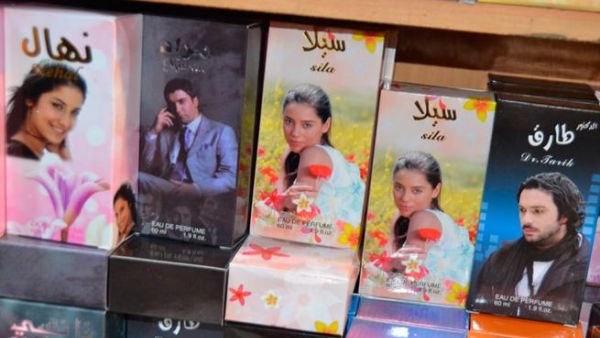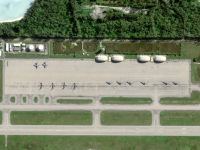Though the Turkish actor Murad Almdar is more famous for his role as gun-wielding action star in the series “Valley of the Wolves,” on the streets of Sana’a— even though he doesn’t know it—he also advertises perfume and socks.
Turkish movie stars like Almdar are very popular here. Their faces adorn labels in shopping centers and in markets and are pasted on perfume bottles, cosmetics and clothes.
But all of this advertising is done without their permission.
“Recently, people have begun following Turkish TV series,” Amar Al-Kaboudi, a clothes trader, said. “And, there’s nothing that stops us from promoting our products using names and photos of those Turkish stars.” Turkish dramas first hit the Arab world in 2008, the American magazine Newsweek reported, when Saudi business mogul Sheik Waleed Al-Ibrahim, who owns the Pan-Arab Middle East Broadcasting Center, bought the rights to a number of Turkish dramas, dubbed them into Syrian Arabic, and aired them all across the Arab world.
Audiences fell in love.
In a 2011 report, the Turkish Economic and Social Studies Foundation surveyed 16 Arab countries and found 75 percent of those surveyed said they had watched Turkish TV before, the National, a leading UAE newspaper, reported.
Ahlam Al-Rubaei, a young woman from Sana’a, said these Turkish celebrities are so popular Yemenis now want to imitate their styles. So, they’ll buy anything that bears their name or face.
But are customers being deceived? Dr. Sa’ad Al-Deen Bin Talib, the minister of Trade and Industry thinks so.
“This is commercial cheating,” Talib told the Yemen Times. These products likely come from China, and have nothing to do with those Turkish actors who appear to be endorsing them, he said. “But the ministry is not directly responsible [for monitoring this].” Business is business, one merchant says, they’ll do whatever they need to move their products.
“The socks are popular,” Salah Al-Muthna, a local merchant, said. “Children’s clothes, too, we name them after famous Turkish actors and bring them to the market.” Eman Ahmed, who lives in Sana’a, doesn’t think it’s strange to see the faces of famous movie stars on clothes labels, even if the celebrities’ have nothing to do with the products.
“I think it’s normal. At the end of the day, I buy the clothes that fit me.” Sahar Al-Faqeh, also from the capital, says the pictures of the actors might catch her eye at first, but if the product is of a cheap quality, she won’t buy it.
Tyseer Al-Marwani, a local in Sana’a, said merchants take advantage of these celebrities popularity to attract customers.
“It a matter of capitalizing on people’s ignorance,” he said.
Hani Abdu Al-Kareem, from Sana'a said that if anyone thinks that these products are actually endorsed by the Turkish movie stars, they’re foolish.
“This generation lacks genuine education, culture and awareness,” he said.
“Such an industry cannot succeed in an educated society.” But some Yemenis object to the products for another reason, not because of their false advertising. Al-Marwani questions why Yemenis are enamored with these Turkish film stars in the first place.
“I don’t think these products suit us,” Al-Marwani said. “[We are] Arabs and Muslims. We don’t need to follow the example of these actors.
“We have our own personalities.”








